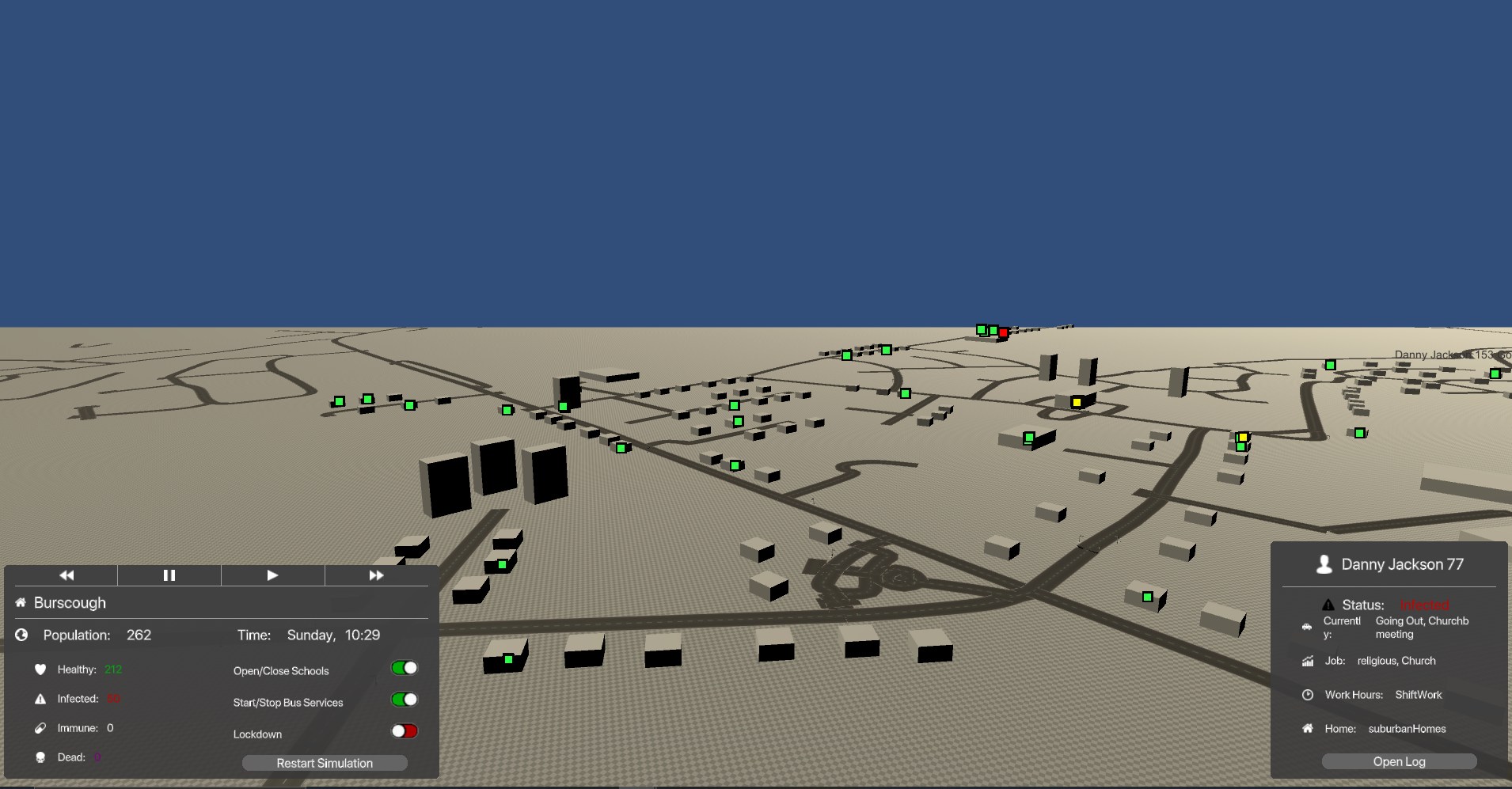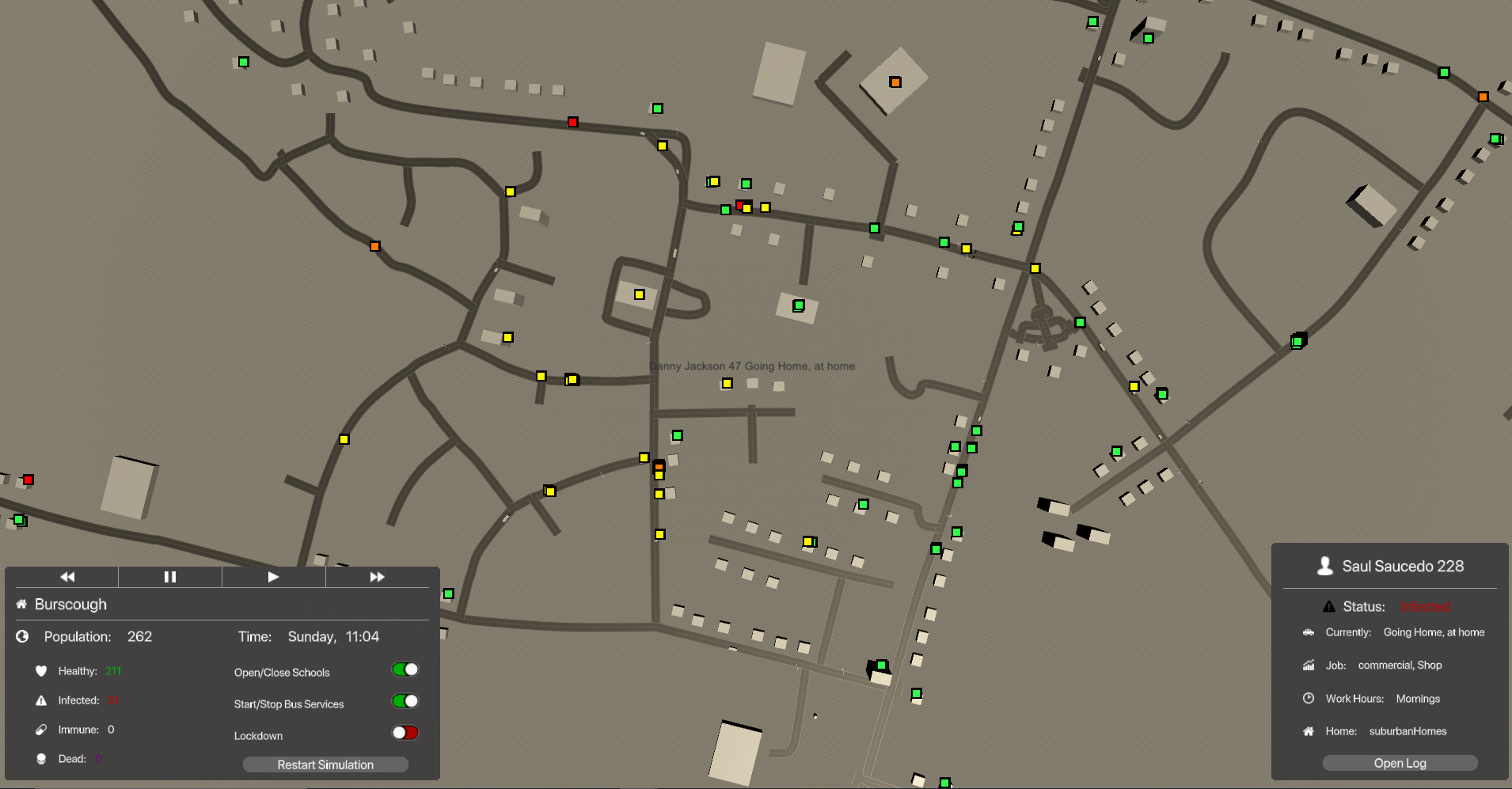CGA Simulation works with Government to create targeted ‘pattern-of-life’ mathematical modelling, to better predict Covid-19 spread
CGA Simulation recently won a Government funding competition (Innovate UK), which was set up to support innovation companies to design technologies that help communities regain normality following the pandemic’s peak.
CGA is mathematically modelling the localised spread of Covid19, using ‘Agent Based Modelling’ (ABM). CGA’s ABM tool will focus specifically on how the virus transmits and spreads across a small town/ community as people go about their day-to-day business.
The team has designed a virtual ‘digital twin’ copy of the ‘hub’ of a town (in this case based on Southport). The simulated town will model community spread of Covid 19, based on simulated interactions amongst humans, their vehicles and frequently visited buildings/ focal points. The team will track and analyse people’s interactions and their likelihood of transmitting the disease as they travel between school, the hairdressers, a bar or church.
The team creates ‘living towns’ like Sim City, using real geography via mapping data. ‘Agents’, the people or cars in the town, commute to work, go for lunch, journey to meet co-workers, or to play football, which allows for more complex and dynamic capturing of ‘real world’ interactions. In addition, ABM assumes that each ‘thing’ being modelled has its own agency, interacting independently with the world around it. Other modelling techniques assume that the things (vehicles, people) being modelled operate with a hive mind. ABM is a more detailed modelling technique than those being used by most academic epidemiology researchers.

Jon Wetherall, Managing Director of CGA Simulation, and simulation modelling expert, explains: “Our technology acknowledges that each person in a community has a different commute to work, school or the gym, and also has different friends and hobbies. Each ‘person’ we model in our digital world makes independent decisions about where they go and what their daily activities will be. This gives a more realistic view of how people moving around a town or a city each day impacts on disease spread.”
He added: “More detailed modelling gives us more complex data, leading to the creation of ‘combination interventions’. The algorithms used by our modelling technology ‘feed’ off the richer, localised data that’s now available. We can generate specific results by modelling the risks associated with opening up different parts of society: cinemas + school + sports facility, to create a mix and match interventions like locking down sections of society, activities or spaces at different times.”
As the pandemic matures, this approach becomes more relevant. We have localised, ‘micro’ data available (at regional/town/neighbourhood level). ABM modelling is one of the most effective modelling tools for generating neighbourhood-level information about where lockdowns could be beneficial.
Bayesian modelling was widely used at the beginning of the pandemic by academics; it was the most effective way of modelling viral spread when data and information about COVID 19 was scarce. However, Bayesian modelling relies on averages and assumptions to model and predict, which means results can be more assumptive.
ABM modelling makes better use of up-to-date evidence, data and information. Dynamic algorithms respond and react to the data-rich information they’re fed, which makes the outcomes more realistic and granular. This is useful for local and regional governments who need to explain to neighbourhoods or central government why localised interventions may be necessary.
ABM technology has also been used to model the role of ‘super spreaders’ on viral transmission. This is another area the team is exploring.

CGA is interested in speaking to and working with organisations currently researching Covid19 and it’s spread, and anyone planning and mitigating against the localised spread of Covid19. To get in touch, please contact: Jon Wetherall, Jon@cgasimulation.com/ 07788757438 or Jaine Pickering, jaine@cgasimulation.com/ 07950402923.
